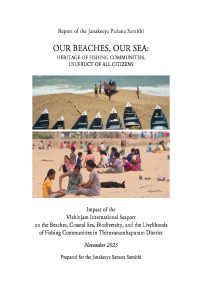 The title of our Report “Our Beaches, Our Sea: Heritage of Fishing Communities, Usufruct of All Citizens” aims to emphasize the profound significance of beaches and the adjacent sea in the historical, occupational, social, and cultural context of fishing communities. These coastal spaces form the bedrock of their livelihood, well-being, and identity.
The title of our Report “Our Beaches, Our Sea: Heritage of Fishing Communities, Usufruct of All Citizens” aims to emphasize the profound significance of beaches and the adjacent sea in the historical, occupational, social, and cultural context of fishing communities. These coastal spaces form the bedrock of their livelihood, well-being, and identity.
We emphasize that beaches are more than just sandy terrains at the confluence of land and sea.
They should not be treated as commodities for private interests or subject to inappropriate infrastructure development. Beaches and the nearby coastal waters are essential for the livelihoods of active fisherfolk, a fundamental right, and a heritage right. Moreover, they provide all citizens the chance to appreciate and enjoy these crucial resources.
The establishment of the Vizhinjam International Seaport (VIS)1, by the Vizhinjam International Seaport Limited (VISL) of the Government of Kerala, has proceeded without any consideration of the above rights.
The port has been a subject of controversy since its inception due to the social and environmental concerns surrounding the livelihoods of coastal communities. This coastal region harbours the highest concentration of traditional fishermen, with the densest population among all coastal villages in the country. The various construction activities planned for the port have significant adverse effects on the livelihoods and safety of the fishing community, the stability of beaches and shorelines, and the preservation of biodiversity. Unfortunately, cultural heritage, aesthetics, and the exceptional natural beauty of the area received minimal consideration during the project’s planning phase.
The apprehension within the fishing community regarding the potential impacts of the Vizhinjam Port were rooted in the distressing experiences stemming from severe coastal erosion and the loss of homes north of a small fishing harbour like Muthalapozhi in Thiruvananthapuram District.
The fishing community made extensive efforts to convey their concerns to authorities at various levels regarding the potential repercussions of another, much larger port construction at Vizhinjam. Regrettably, environmental clearance (EC) for the project was granted without giving adequate attention to the very legitimate concerns of the fishing community.